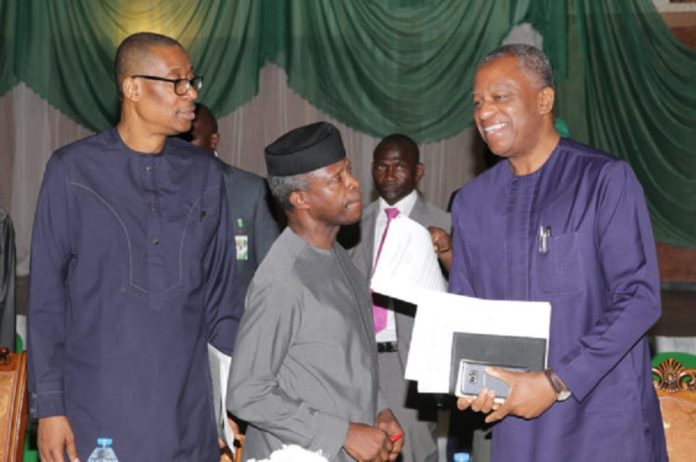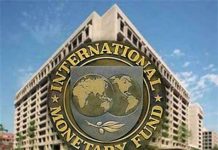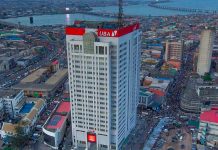
Vice President Yemi Osinbajo has welcomed the collaboration of Chartered Institute of Stockbrokers and the Federal Government that will provide a platform for economic growth through opportunities like using the capital/financial markets to address the country’s infrastructural deficit.
Speaking at interactive forum organized by the Chartered Institute of Stockbrokers in Lagos, the Vice President said that although the President Muhammadu Buhari administration met a weak economy when it came into power in 2015, it has set the country on a path of growth, industrialization and sound resource management.
Represented by the Honorable Minister of Industry, Trade and Investment, Dr. Okey Enelamah, the Vice President highlighted some of the challenges in 2015 as including rising inflation, declining reserves, exchange rate instability, and a sharp drop in oil revenues, all of which resulted in an economic recession.
He said the government has been able to reverse the decline through the implementation a Strategic Implementation Plan and the Nigeria Economic Recovery and Growth Plan.
“Our first step was to create an enabling environment for businesses to thrive,” he said. “We implemented Ease of Doing Business reforms, Foreign Exchange Market reforms, provided incentives such as the Pioneer Status incentive for investors and signed bilateral agreements with countries like China, Germany, and the UK.”
According to the Vice President, Nigeria has also moved aggressively on the path and policies to industrialisation with the establishment of the Nigerian Industrial Policy and Competitiveness Council fora close partnership with the private sector in order to implement the Nigerian Industrial Revolution Plan. He said six Special Economic Zones are being created in different geopolitical zones and key sectoral policies from tomato to sugar and automotive are being implemented.
Other initiatives highlighted include: Upscaling agriculture with over N120.6 billion disbursed so far to more than 800,000 farmers under the Anchor Borrowers Scheme; the Social Investment Programme under which farm produce has been from over 100,000 farmers to feed 9.2 million school children daily; the GEM programme, which has disbursed over N3.7 billion to 910 entrepreneurs; Public Finance Reforms and Conditional bailouts of sub-national governments.
“The reforms have clearly put us back on the path of growth. Our GDP has grown consistently for the past six quarters, our exchange rate market is stable, our inflation rate has declined even below the ERGP target of 12.4 percent for 2018; we have gone from negative to positive trade balance and our external reserves which stood at over $43 billion in December 2018 has been on a sustained increase,” said VP Osinbajo.
Dr. Enelamah also highlighted the central role being played by the Federal Ministry of Industry, Trade and Investment under his leadership to drive some of the ongoing economic reforms. He said Nigeria progressed by 24 places between 2016 and 2018 in the World Bank Doing Business rankings.
“The Federal Government in August 2018 during the visit of German Chancellor Angela Merkel signed an MoU with Volkswagen to produce vehicles in Nigeria,” Enelamah said.
“We revamped our bilateral, regional and multilateral trade agreements to construct value chains for growth, job creation and modernization.
“We drove financial intervention to MSMEs with GEM and GEEP (MarketMoni, FarmerMoni and TraderMoni), and we also strengthened our intellectual property regulation to foster and protect innovation,” Enelamah said.
The minister said that the next phase of his ministry’s efforts will consolidate and build on the current momentum by institutionalizing reforms in the business environment, scaling up programs and technical assistance strengthening MSMEs, and developing Nigeria’s key value chains to global leadership.
Ms. Yewande Sadiku, Chief Executive Officer of Nigeria Investment Promotion Commission outlined efforts being made by the Commission to attract investors across the globe into Nigeria through an array of incentives.
The Acting Direcctor-General of the Securities and Exchange Commission, Ms Mary Uduk called for privatisation of moribund government enterprises through the market.
According to her, such move this would not only ensure revival of the companies, but also deepen the market after listing.
President/Chairman of the Institute Adedapo Adekoje said the forum was for the exchange of informed opinion on developmental issues such as redesigning the financial market architecture for fiscal stability, spurring growth and reducing unemployment.
He urged the government to use the market to fund its fiscal budget with ease. He reiterated the need to re-constitute the board of the Securities and Exchange Commission (SEC) and accord the Commission a status of independence like the Central Bank of Nigeria (CBN) in line with the global best practices.
In a presentation Mr. Mike Itegboje, a former president of CIS, pointed out that developed economies leveraged the market for growth and development and urged the Federal Government to emulate countries, such as the United States and China, which place premium on the use of their markets for development.









